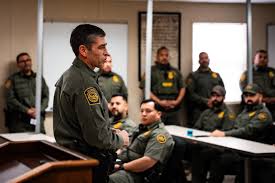Understanding the Role of US Border Officers Today

Introduction
The role of US border officers has become increasingly significant in the context of evolving immigration policies and cross-border security concerns. These officers are tasked with managing the flow of people and goods at the United States’ borders, which is critical for national security, public health, and economic stability.
Current Challenges
As of late 2023, US border officers are facing numerous challenges that impact their operational effectiveness. A key issue is the surge in migration at the southern border, where record numbers of individuals are attempting to enter the United States. According to Customs and Border Protection (CBP), more than 2 million encounters were reported in the fiscal year 2022, necessitating an adjustment in resources and strategies.
In addition to the migration surge, border officers are tasked with enforcing new regulations related to public health safety and drug trafficking. The introduction of stricter entry guidelines related to health standards post-COVID-19 has complicated the already challenging task for these officers. Moreover, the opioid crisis has added another layer of complexity, with efforts to intercept fentanyl and other dangerous substances entering the country.
Technological Advancements
To address these challenges, US border agencies are increasingly turning to technology. Enhanced surveillance systems, biometric identification tools, and data analytics are being incorporated to improve efficiency and accuracy in border enforcement. For instance, the use of advanced facial recognition technology is becoming more common at ports of entry, helping officers quickly verify identities while reducing wait times for travelers.
Community Relations and Training
Moreover, there is a growing focus on community relations and the training of border officers in areas such as cultural sensitivity and de-escalation techniques. With immigration issues being highly charged and politically sensitive, fostering trust between border officers and the communities they serve is essential. Ongoing training programs aim to equip officers with the necessary skills to handle diverse scenarios with compassion and professionalism.
Conclusion
The role of US border officers remains crucial amid ongoing challenges and changes within immigration systems. Moving forward, it is expected that technology will play a larger role in how border security operates, while community engagement will enhance the relationship between officers and citizens. The commitment to adapt and evolve will be vital in facing future challenges and ensuring the safety and security of the nation’s borders.


